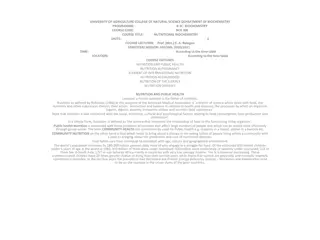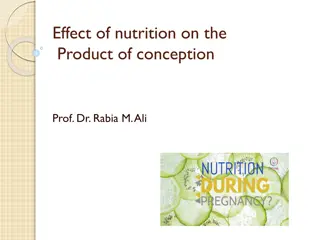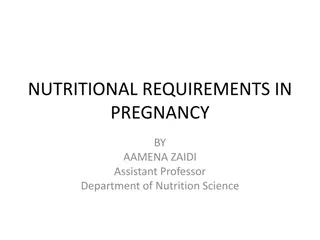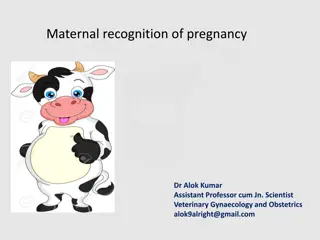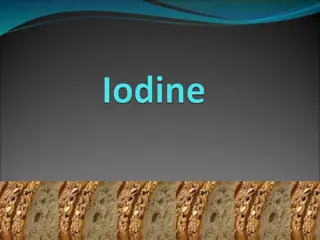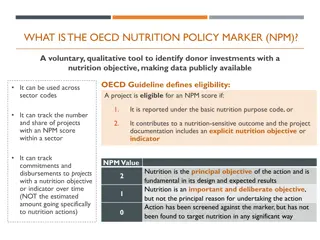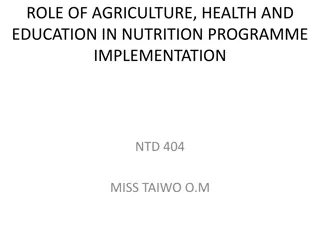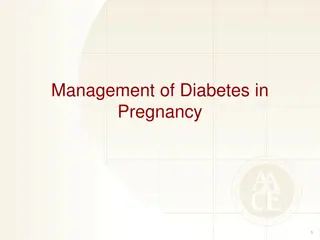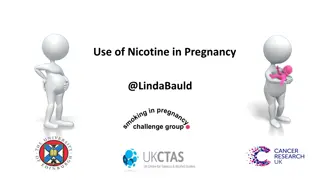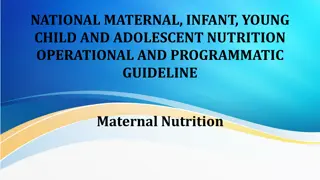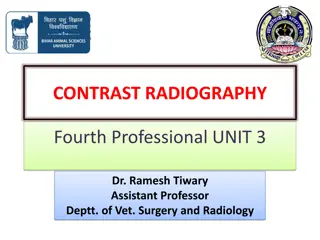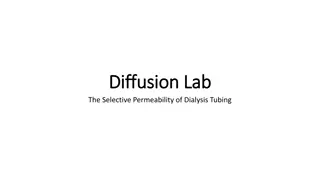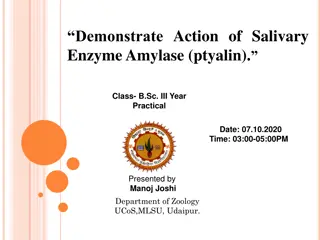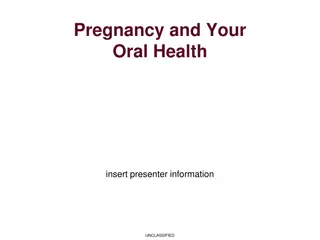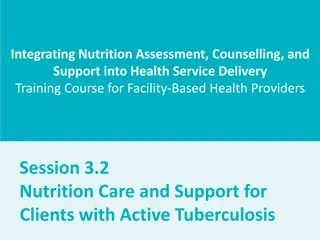Importance of Iodine Nutrition During Pregnancy
Iodine is essential for thyroid hormone synthesis, crucial for neurological development in utero and early life. Adequate iodine levels prevent adverse effects like decreased IQ, goiter, hypothyroidism, and hyperthyroidism. Mild to moderate iodine deficiency in pregnant women can have adverse outcomes, emphasizing the need for proper iodine nutrition during pregnancy.
Download Presentation

Please find below an Image/Link to download the presentation.
The content on the website is provided AS IS for your information and personal use only. It may not be sold, licensed, or shared on other websites without obtaining consent from the author.If you encounter any issues during the download, it is possible that the publisher has removed the file from their server.
You are allowed to download the files provided on this website for personal or commercial use, subject to the condition that they are used lawfully. All files are the property of their respective owners.
The content on the website is provided AS IS for your information and personal use only. It may not be sold, licensed, or shared on other websites without obtaining consent from the author.
E N D
Presentation Transcript
IODINE NUTRITION DURING PREGNANCY H. Delshad M.D Endocrinologist Research Institute For Endocrine Sciences
TSH T3 T4 Iodine Thyroid Hormone Synthesis
Iodine nutrition and thyroid function Iodine is an essential component of thyroid hormone. In turn, thyroid hormone is critical for neurological development both in utero and in early life. Sever iodine deficiency results in a spectrum of disorders Correction of sever iodine deficiency has resulted in better clinical outcomes , worldwide.
The adverse effects of iodine deficiency in populations (decreased IQ, goiter, hypothyroidism, and hyper-thyroidism) are easily corrected with salt iodisation. Adequate iodine nutrition in the general population is shown by a median urinary iodine concentration for school-age children (aged 6 12 years) of 100 299 g/L Adequate iodine nutrition in pregnant women is shown by a median urinary iodine concentration between 150 and 499 g/L
Iodine nutrition and thyroid function Mild moderate iodine deficiency has re- emerged in countries previously believed to be iodine sufficient. Lately, there has been increasing concern that even mild-to-moderate iodine deficiency has adverse clinical outcomes. Iodine nutrition during pregnancy has become an important public health concern
pregnant women ( n ) Author Country % UIC < 150 g/L Median UIC g/L ( IQR ) Katz PM 2013 Canada Toronto 142 221 29.6 ( 142 397 ) Lindorfer H 2015 Austria Viena 246 87 86.2 Granfors M 2015 Sweden 459 98 100 ( 57 148) Fuse Y 2011 Japan 934 219 16.1 Bath SC 2015 UK 230 56.8 98 Bath SC 2014 South East UK 100 85.3 86 Knight BA 2016 South West UK 308 88 73 ( 54.3 157.5) Iodine user : 118 ( 79 196 ) Kirkegeard 2016 Denmark 240 Non-users: 82 ( 41 122)
pregnant women ( n ) Author Country % UIC < 150 g/L Median UIC g/L ( IQR ) Kasap B 2016 Turkey 135 222 28.1 ( 141 397 ) Ferreiya SM 2014 Brazil 191 137.7 92 (132.9 155.9 ) Bilek R 2016 Czech Republic 532 82 71.2 De Zoysa E 2016 Sri Lanka 425 105 98 (67 153) Konrad I 2015 Latvia 696 69.4 100 (53.9 92.6 ) Raverot V 2012 French Lyon 228 81 77 ( 8 832 ) Choyy 2016 Korea 344 427.3 -
Mean SD age of the cohort : 27 7.2 years. Mean SD gestational age:20.7 10.0 weeks. T4 ( g/dl) UIE ( g/L) TSH mIU/L ) ( Min. 20 4.92 0.01 Max. Preliminary Results : 400 23.92 14.05 Mean 114 11.19 2.20 10.88 Median 87.3 1.95
Conclusion Pregnant women living in mild-moderate iodine deficient areas are at particularly high risk of being iodine deficient. Clinical question Iodine supplementation in pregnancy- is it time?
How big is the problem? 32 countries ( 1/3 of the global population) still have inadequate iodine intake. In Europe: 21 countries are iodine deficient in pregnancy 10 countries are iodine sufficient In 23 countries no data are available
What is the evidence for benefit from iodine supplementation in pregnancy in mild-moderate iodine deficiency? Avon Longitudinal Study of Parents and Children ( ALSPAC) study in UK 1040 mother-child pairs mild-to-moderate iodine deficiency (UIC < 150 g/l ) in the first trimester of pregnancy : odds of offspring IQ being in the lowest quartile OR = 1.43; 95%CI 1.04-1.98; P=0.03
Hynes et al. from Australia Mild iodine deficiency during pregnancy is associated with reduced educational outcomes in the offspring: 9-year follow-up of the gestational iodine cohort. JCEM 2013
These studies imply there are potentially substantial benefits from correcting/ preventing even mild iodine deficiency in pregnancy.
Taylor et al. Impact of iodine supplementation in mild-to- moderate iodine deficiency: systematic review and meta-analysis. Eur J Endo. 2014 Correction of maternal mild-moderate iodine deficiency is likely to improve neurological development of offspring.
Summary of relevant national and societal guidelines Guideline Guidance All women who are planning to be pregnant or are pregnant or breastfeeding should supplement their diet with a daily oral supplement of 150 g of iodine ATA Australian Department of Health ETA US Teratology Society Endocrine Society (Endocrine Society : 150 - 200 g ) American Academy of Pediatrics Spanish Endocrine Society World Health Organization Pregnant and lactating women should take a supplement containing adequate iodine to achieve a total of 250 g iodine / day. UK Department of Health British Thyroid Association No specific guidance on iodine intake
Key message It is probable that, in mild-moderate iodine deficient countries, iodine supplementation during pregnancy and lactation may have substantial obstetric and offspring benefits and is economically advantageous.



